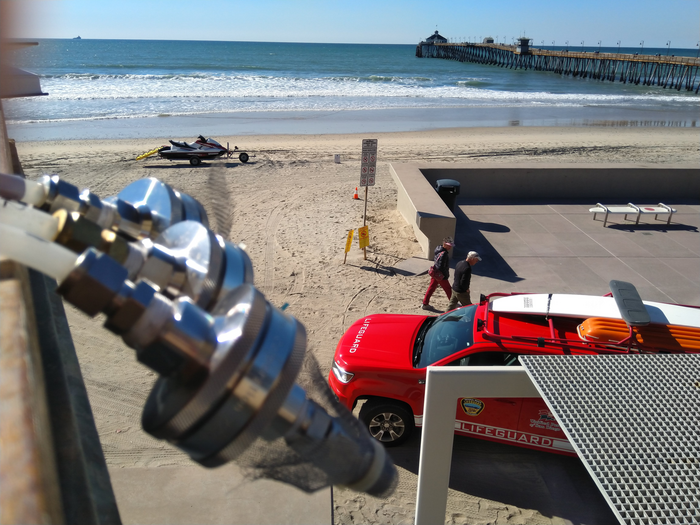New research led by Scripps Institution of Oceanography at UC San Diego has confirmed that coastal water pollution transfers to the atmosphere in sea spray aerosol, which can reach people beyond just beachgoers, surfers, and swimmers.

Credit: Matthew Pendergraft
New research led by Scripps Institution of Oceanography at UC San Diego has confirmed that coastal water pollution transfers to the atmosphere in sea spray aerosol, which can reach people beyond just beachgoers, surfers, and swimmers.
Rainfall in the US-Mexico border region causes complications for wastewater treatment and results in untreated sewage being diverted into the Tijuana River and flowing into the ocean in south Imperial Beach. This input of contaminated water has caused chronic coastal water pollution in Imperial Beach for decades. New research shows that sewage-polluted coastal waters transfer to the atmosphere in sea spray aerosol formed by breaking waves and bursting bubbles. Sea spray aerosol contains bacteria, viruses, and chemical compounds from the seawater.
The researchers report their findings March 2 in the journal Environmental Science & Technology. The study appears in the midst of a winter in which an estimated 13 billion gallons of sewage-polluted waters have entered the ocean via the Tijuana River, according to lead researcher Kim Prather, a Distinguished Chair in Atmospheric Chemistry, and Distinguished Professor at Scripps Oceanography and UC San Diego’s Department of Chemistry and Biochemistry. She also serves as the founding director of the NSF Center for Aerosol Impacts on Chemistry of the Environment (CAICE).
“We’ve shown that up to three-quarters of the bacteria that you breathe in at Imperial Beach are coming from aerosolization of raw sewage in the surf zone,” said Prather. “Coastal water pollution has been traditionally considered just a waterborne problem. People worry about swimming and surfing in it but not about breathing it in, even though the aerosols can travel long distances and expose many more people than those just at the beach or in the water.”
The team sampled coastal aerosols at Imperial Beach and water from the Tijuana River between January and May 2019. Then they used DNA sequencing and mass spectrometry to link bacteria and chemical compounds in coastal aerosol back to the sewage-polluted Tijuana River flowing into coastal waters. Aerosols from the ocean were found to contain bacteria and chemicals originating from the Tijuana River. Now the team is conducting follow-up research attempting to detect viruses and other airborne pathogens.
Prather and colleagues caution that the work does not mean people are getting sick from sewage in sea spray aerosol. Most bacteria and viruses are harmless and the presence of bacteria in sea spray aerosol does not automatically mean that microbes – pathogenic or otherwise – become airborne. Infectivity, exposure levels, and other factors that determine risk need further investigation, the authors said.
This study involved a collaboration among three different research groups – led by Prather in collaboration with UC San Diego School of Medicine and Jacobs School of Engineering researcher Rob Knight, and Pieter Dorrestein of the UC San Diego Skaggs School of Pharmacy and Pharmaceutical Science, both affiliated with the Department of Pediatrics – to study the potential links between bacteria and chemicals in sea spray aerosol with sewage in the Tijuana River.
“This research demonstrates that coastal communities are exposed to coastal water pollution even without entering polluted waters,” said lead author Matthew Pendergraft, a recent graduate from Scripps Oceanography who obtained his PhD under the guidance of Prather. “More research is necessary to determine the level of risk posed to the public by aerosolized coastal water pollution. These findings provide further justification for prioritizing cleaning up coastal waters.”
Additional funding to further investigate the conditions that lead to aerosolization of pollutants and pathogens, how far they travel, and potential public health ramifications has been secured by Congressman Scott Peters (CA-50) in the Fiscal Year (FY) 2023 Omnibus spending bill.
Besides Prather, Pendergraft, Knight and Dorrestein, the research team included Daniel Petras and Clare Morris from Scripps Oceanography; Pedro Beldá-Ferre, MacKenzie Bryant, Tara Schwartz, Gail Ackermann, and Greg Humphrey from the UC San Diego School of Medicine; Brock Mitts from UC San Diego’s Department of Chemistry and Biochemistry; Allegra Aron from the UC San Diego Skaggs School of Pharmacy and Pharmaceutical Science; and independent researcher Ethan Kaandorp. The study was funded by UC San Diego’s Understanding and Protecting the Planet (UPP) initiative and the German Research Foundation.
Journal
Environmental Science & Technology
Method of Research
Experimental study
Subject of Research
Not applicable
Article Title
Bacterial and Chemical Evidence of Coastal Water Pollution from the 2 Tijuana River in Sea Spray Aerosol
Article Publication Date
2-Mar-2023




